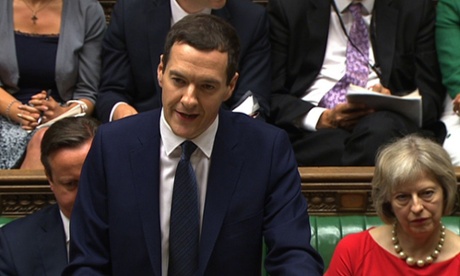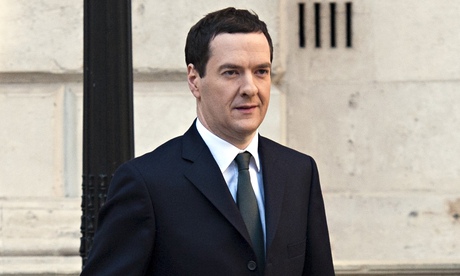It all seemed to be going well for George Osborne. A confident display in the Commons. A big increase in the minimum wage. Headlines to die for in the Conservative-supporting papers.
Then the Institute for Fiscal Studies came along. Over the years it has become almost a ritual, whichever party is in power, for the IFS to pick the budget to pieces. This was no exception and Osborne’s latest offering got the full treatment.
The thinktank gave short shrift to the idea that what the chancellor calls a “national living wage” will compensate for the cuts to welfare. Reductions in the welfare bill will save the Treasury £12bn by the end of the decade, while the gross increase in pay from the higher minimum wage is £4bn. Downing Street disputed the IFS analysis, saying it was not known how many would lose from the benefit changes or gain from the minimum wage. Do the maths, said the IFS director, Paul Johnson.
The winners and losers from the budget will be different groups of people. That, as the IFS pointed out, is because the tax credits being cut by Osborne are designed to support those with low family incomes, while minimum wages help those on low hourly wages. You can be on the minimum wage but have a partner on a high income, meaning that the household as a whole is well off even when one worker is earning £6.50 an hour. Many of those who will gain from Osborne’s second budget of 2015 will be single people without children or married to someone on a good salary. They don’t claim tax credits, so they won’t be affected when they are cut.
The losers are numerous and many of them will be hit hard by the changes. Most working-age benefits, tax credits and housing benefit will be frozen for the next four years, and once inflation is taken into account that will mean 13 million families losing an average of £260 a year.
The other big change – making the new universal credit less generous – results in much bigger losses but to a smaller number of people. What the chancellor has announced is that people will not be able to earn as much before their tax credits start to be removed. Previously the limit was £6,420, but it will be reduced to £3,850, costing around 3 million people around £1,000 a year on average.
There are two big consequences of this move, according to the IFS. The first is to weaken the incentive for families to have someone in work, which runs counter to the government’s aim of moving people off welfare and into employment. The second is to make the tax and benefits system more regressive.
This is clearly shown by the IFS’s distributional analysis of the budget, which splits Britain into 10 deciles, ranging from the poorest through to the 10% richest households. The biggest losers from the package were not those in the poorest decile but in the second and third poorest tenths of the population. That’s because those who are not working are concentrated in the poorest decile, and they were hit less hard by Osborne than the working poor.
As a share of income, a household in the second poorest decile will be more than 7% worse off as a result of the budget and changes previously announced. The losses get steadily smaller as households get richer, up to the ninth decile, which is better off as a result of the budget. The richest 10% of households loses, but only marginally.
Up to now it has been possible for Osborne to say that those with the broadest shoulders have borne the biggest share of the burden from the tax increases and benefit cuts deemed essential to knock the public finances back into shape. After the latest budget, according to the IMF, that is no longer the case. Looking at all the changes made since January 2010, some of them announced by the last Labour government, the two poorest deciles are 11% worse off; the richest decile has suffered a 7% hit.
One of the unwritten rules of politics is that budgets that look good as an idea don’t stand the test of time. The IFS pointed out a few reasons why this might be the case this time round. The first is that four years of 1% pay increases in the public sector threatens to cause problems of recruitment and retention because jobs in the private sector will become more attractive. The second is that while the tax cuts made by the chancellor are for real, some of the tax increases look a bit more dubious. That could leave a bigger deficit than expected.
Its third point is that the addition of the Ministry of Defence to the list of ring-fenced departments will mean that the rest of Whitehall will have to make savings of £19bn. If Theresa May serves two whole terms as home secretary, her budget will be one-third smaller in real terms in 2020 than it was in 2010.











